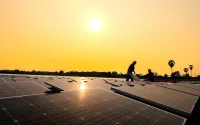The World in 2008
Over the past couple of years, climate change has arrived on the political map. A lot of different people helped to put it there: Al Gore, who came to life inspiring Americans on the topic; Sir Nicholas Stern, who counted the cost in a report to the British government; American businessmen, who started lobbying the administration to take action; American legislators, who have been pushing for measures to combat global warming since 2006; voters, who according to the polls began to take a serious interest in the subject; and journalists, who always jump on a bandwagon when they see one rolling by.
Now that the world has recognised the problem, it wants a solution. That is good, but dangerous, because expectations are mounting and the rhetoric is running high. There is a risk that 2008 may be a let-down, for the two big things needed to combat climate change are unlikely to be put in place next year.
What won’t happen
The first thing is serious federal climate-change controls in America. The Democrats, by and large, want federal controls, and they are in charge of the legislature. But some Democrats—especially those associated with organised labour—are hostile to the idea. Some don’t want legislation yet because they want to keep the issue alive during the presidential election. The more radical greens want to wait until a Democratic president is ensconced, on the ground that they’ll get a tougher scheme if they do. Opposition from such groups, as well as from Republicans, and the sheer complexity of carbon-emissions controls, mean that anything more than minor tinkering will have to wait.
Second, a framework for a new international agreement is needed. The Kyoto protocol can claim some achievements (such as Europe’s Emissions-Trading Scheme) but it has failed in its main aim—of getting the world’s big polluters to agree on how to cut carbon-dioxide emissions. If America and China are to be included, a new agreement must be reached. That’s not going to happen in the coming year, either.
Over the past couple of years, climate change has arrived on the political map. A lot of different people helped to put it there: Al Gore, who came to life inspiring Americans on the topic; Sir Nicholas Stern, who counted the cost in a report to the British government; American businessmen, who started lobbying the administration to take action; American legislators, who have been pushing for measures to combat global warming since 2006; voters, who according to the polls began to take a serious interest in the subject; and journalists, who always jump on a bandwagon when they see one rolling by.
Now that the world has recognised the problem, it wants a solution. That is good, but dangerous, because expectations are mounting and the rhetoric is running high. There is a risk that 2008 may be a let-down, for the two big things needed to combat climate change are unlikely to be put in place next year.
What won’t happen
The first thing is serious federal climate-change controls in America. The Democrats, by and large, want federal controls, and they are in charge of the legislature. But some Democrats—especially those associated with organised labour—are hostile to the idea. Some don’t want legislation yet because they want to keep the issue alive during the presidential election. The more radical greens want to wait until a Democratic president is ensconced, on the ground that they’ll get a tougher scheme if they do. Opposition from such groups, as well as from Republicans, and the sheer complexity of carbon-emissions controls, mean that anything more than minor tinkering will have to wait.
Second, a framework for a new international agreement is needed. The Kyoto protocol can claim some achievements (such as Europe’s Emissions-Trading Scheme) but it has failed in its main aim—of getting the world’s big polluters to agree on how to cut carbon-dioxide emissions. If America and China are to be included, a new agreement must be reached. That’s not going to happen in the coming year, either.
http://www.economist.com/theworldin/leaders/displayStory.cfm?story_id=10125775&d=2008






